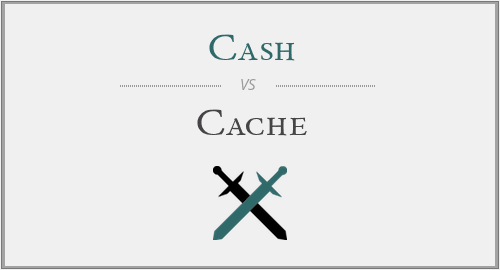English is a complicated language. There are some words in English that sound exactly the same but have different spellings and meanings. These words are called homophones and they are a cause of confusion for many young learners and natives alike. Cash and cache are an example of a pair of homophones that sound alike. Many people pronounce cache as kayshe or kachay but the correct pronunciation of cache is exactly like cash.
Though cash is a very common word, cache might still be a new word for many people here, so we will discuss both of them in detail.
Origin:
Cash originated in late 16th century (denoting a box for money): from Old French casse or Italian cassa ‘box’, from Latin capsa (see case2).
Cash as noun:
Cash is used as a noun which means money in coins or notes, as distinct from cheques, money orders, or credit.
The staff were paid in cash.
Cache as noun:
Cache is used as a noun in English too which means a collection of items of the same type stored in a hidden or inaccessible place.
We approached an arms cache.
In computers language, an auxiliary memory from which high-speed retrieval is possible is called a cache.
Typical cache sizes range from 64K to 256K.
Examples:

You’ve now successfully reset your App Store’s cache, emptying out the temporary storage that can cause your phone to act sluggish or cause your apps to fail to update. (Business Insider)
A cache containing ten mortar shells, two kalachnikov guns and important quantity of ammunitions were discovered Friday in Tin Zaouatine, by a detachment of the National Popular Army (ANP), said National Defence Ministry (MDN) said in a communiqué. (Algerie Presse Service)
Yemeni security forces have seized a large cache of weapons in Al Tawahi district of Aden, an area where illegal armed groups have established a strong presence. (The National)
Pension consultants say some fund managers are considering socking even more of their assets into cash as they wait for the markets to calm down. (The Wall Street Journal)
Investigators say Howard would take checks made out to Jacaranda Golf Club, put them into the cash register inside the facility’s pro shop but input an amount that was lesser than the check’s face value. (The Sun-Sentinel)
The philosophy behind Project Issara’s cash transfer program is simple: No one knows the needs of human trafficking victims better than the victims themselves. (The Christian Science Monitor)
Cash or Cache:
Cache is a hiding place, especially one in the ground, for ammunition, food, treasures, etc.; an area of computer memory devoted to the high-speed retrieval of frequently used or requested data. Cash is money in the form of coins or banknotes, especially that issued by a government. Cache and cash are pronounced the same but have different spellings and meanings. A common error in writing is to spell “cache” as “cash”.
The stolen cash was found in a cache located through information recovered on a computer’s cache.
Get it? We don’t blame you!




Have a discussion about this article with the community:
Report Comment
We're doing our best to make sure our content is useful, accurate and safe.
If by any chance you spot an inappropriate comment while navigating through our website please use this form to let us know, and we'll take care of it shortly.
Attachment
You need to be logged in to favorite.
Log In